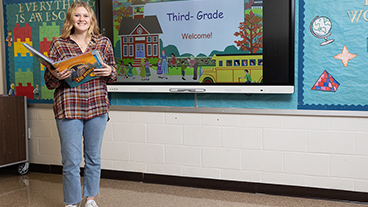
Elementary, Middle Level, Library & Technologies Education
Early Childhood Education Degree, Pre-K-4
Become the elementary school teacher students never forget.
Quick Look
OFFERED AS:
Major
FORMAT:
In-Person
CREDITS REQUIRED:
120
Earn your early childhood education degree in Pre-K-4 from one of the best colleges for education in Pennsylvania, according to Niche.
Here at Kutztown University, we’re committed to diversity, equity and inclusion in your classes and your future classroom. Becoming an early childhood education major at KU will allow you to:
- Get on-site student teaching experience
- Earn a teaching certification in Pre-K-4
- Lead your own classroom before graduation
- Be ready for a life-changing career
Why Choose KU for an Early Childhood Education Degree
Kutztown University is what students call their “home away from home.” From strong educational training and student teaching to learning how to support a child’s academic journey, your future classroom begins here.
We have helped thousands of students become teachers for more than 100 years. We welcome students from different backgrounds and will help you turn your degree in elementary education into an impactful teaching career.

Early Elementary Education Degree Highlights
Our early childhood education program prepares future educators like you to teach infants, toddlers, preschoolers, kindergarteners and students in grades one through four.
Program Highlights:
- Become a well-versed leader in early childhood education
- Learn how to build a safe, inclusive and welcoming classroom environment
- Develop strong professional speaking skills
- Learn to teach subjects like language arts, math, science, social studies
- Apply your coursework as a student teacher
- Train with classroom technology, such as smartboards, coding, robots, VR
- Get access to State Testing Requirements for Pre-K-4
Student Learning Outcomes
-
Teacher Certification Programs (B.S.Ed)
(includes Elementary Education, Secondary Education and Special Education programs)
All initial teacher certification programs use the ten InTASC standards (required by CAEP accreditation) as their Student Learning Outcomes (SLOs). The ten InTASC standards are organized in 4 domains (The Learner and Learning, Content Knowledge, Instructional Practice, and Professional Responsibility).
- Learner Development - The teacher candidate will understand how learners grow and develop, recognizing that patterns of learning and development vary individually within and across the cognitive, linguistic, social, emotional, and physical areas, and designs and implements developmentally appropriate and challenging learning experiences.
- Learning Differences - The teacher candidate will be able to use understandings of individual differences and diverse cultures and communities to ensure inclusive learning environments that enable each learner to meet high standards.
- Learning Environments - The teacher candidate will be able to work with others to create environments that support individual and collaborative learning, and that encourage positive social interaction, active engagement in learning, and self-motivation.
- Content Knowledge - The teacher candidate will be able to understand the central concepts, tools of inquiry, and structures of the discipline(s) he or she teaches and creates learning experiences that make the discipline accessible and meaningful for learners to assure mastery of the content.
- Application of Content - The teacher candidate will be able to understand how to connect concepts and use differing perspectives to engage learners in critical thinking, creativity, and collaborative problem solving related to authentic local and global issues.
- Assessment - The teacher candidate will be able to understand and use multiple methods of assessment to engage learners in their own growth, to monitor learner progress, and to guide the teacher candidate's and learner's decision making.
- Planning for Instruction - The teacher candidate will be able to plan instruction that supports every student in meeting rigorous learning goals by drawing upon knowledge of content areas, curriculum, cross-disciplinary skills, and pedagogy, as well as knowledge of learners and the community context.
- Instructional Strategies - The teacher candidate will be able to understand and use a variety of instructional strategies to encourage learners to develop
deep understanding of content areas and their connections, and to build skills to apply knowledge in meaningful ways. - Professional Learning and Ethical Practice - The teacher candidate will be able to engage in ongoing professional learning and use evidence to continually evaluate his/her practice, particularly the effects of his/her choices and actions on others (learners, families, other professionals, and the community), and adapts practice to meet the needs of each learner.
- Leadership and Collaboration - The teacher candidate will be able to seek appropriate leadership roles and opportunities to take responsibility for student learning, to collaborate with learners, families, colleagues, other school professionals, and community members to ensure learner growth, and to advance the profession.
I recommend Kutztown University’s education program because of the networking incorporated into the program. We were given opportunities for school observations early in the program and interview workshops with local school administrators. These connections helped me find my current teaching job.
Karrison Dubbs ‘23, Elementary School Teacher, Pottsville School DistrictEarly Childhood Education Major FAQ
-
What is early childhood education and why is it important?
The early childhood education degree from Kutztown University focuses on educating children from birth to approximately fourth grade. However, the program is more than learning how to teach primary students. It’s about the holistic development of a child’s social, emotional and cognitive skills and helping them develop interests they carry into adulthood.
-
What can I do with an early elementary education degree?
Becoming an early elementary education major opens the door to many highly rewarding career opportunities. KU graduates will be skilled in teaching language arts, science, math, reading and social studies.
Here are career pathways you can choose from:
- Art teacher
- Elementary school administrator
- Elementary school teacher
- Foreign language professor
- Instructional coordinator
- Kindergarten teacher
- Librarian
- Public school administrator
- School district elementary education coordinator
- School nurse
- School psychologist
- Social worker
- Special education teacher
-
What is the best minor for an early childhood education major?
The following minors are widely considered to be the top choices for an early childhood education major, according to the Kutztown’s Elementary Education program faculty.
- Special education
- Psychology
- Sociology
- Communication studies
-
Is an early elementary education degree in demand in the U.S.?
Yes. According to the U.S. Bureau of Labor Statistics, employment of schoolteachers is expected to grow about 3% over the next eight years. This means that about 60,000 new kindergarten and elementary teaching jobs will be created each year by 2031.






